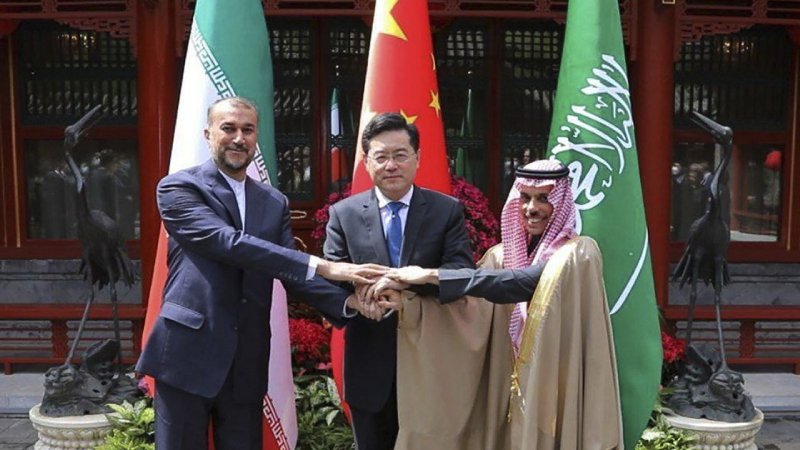World
Saudi and Iran Restore Diplomatic Ties in Search of Mideast Regional Stability and Peace

After a seven-year rift, Iran and Saudi Arabia, longtime rivals in the Middle East, officially restored diplomatic ties on Thursday, recognizing the significance of regional stability and agreeing to pursue economic cooperation.
A month after China had mediated an initial reconciliation agreement between the two regional powerhouses, the agreement was reached in Beijing during a meeting between the Iranian and Saudi foreign ministers.
The latest understanding further brings down the opportunity for armed conflict between the adversaries, both directly and in proxy clashes around the region. It could reinforce efforts by diplomats to end a long conflict in Yemen, a contention in which both Iran and Saudi Arabia are deeply entrenched.
Thursday’s declaration additionally represents one more diplomatic victory for the Chinese as Gulf Arab states see the US gradually pulling out from the more extensive region.
However, it is unknown how far the reconciliation efforts will advance. The 1979 revolution that overthrew Iran’s Western-backed monarchy sparked the rivalry, and in recent years, the two countries have supported opposing armed groups and political factions in the region.
After meeting with Saudi counterpart Prince Faisal bin Farhan Al Saud, Iranian Foreign Minister Hossein Amirabdollahian tweeted out the specifics of the agreement on Thursday.
“Official diplomatic relations… economic and commercial cooperation, the reopening of embassies and consulates general, and the emphasis on stability, stable security, and development of the region,” the minister wrote. Amirabdollahian said that the issues are “agreed upon and on the common agenda.”
Diplomatic missions would begin operating in Jeddah in Saudi Arabia and Mashhad in Iran, in addition to reopening embassies in the two capitals. According to the report, in addition to figuring out how to make the visa application process easier for their citizens, both sides agreed to investigate the possibility of resuming flights as well as official and private visits between the two countries.
Last month, China’s Foreign Ministry reported that the two sides had agreed to reopen their missions and embassies within two months.
According to Mao Ning, a spokesperson for the Chinese Foreign Ministry, the two foreign ministers signed a joint statement in which they pledged to strengthen ties, echoing their discussions in Beijing last month.
“Discussions were held on joint relations and ways to enhance cooperation in many fields,” according to a brief news item published by the state-run Saudi Press Agency, with both sides aiming to “enhance the security, stability, and prosperity of the two countries and peoples.”
Senior diplomats from the two countries met in Beijing on Thursday for the first time since Saudi Arabia cut ties with Iran in 2016 when protesters broke into Saudi diplomatic posts. The demonstrations were sparked by Saudi Arabia’s earlier execution of 46 other prominent Shiite clerics 46 days earlier.
Mao stated at the briefing that the expansion of ties demonstrates that “regional countries have the will and ability to take the lead” in preserving peace.
She urged the international community to assist the Middle Eastern nations in resolving their differences, stating that China is prepared to assist both sides in fostering good relations.
“The colonial hegemonic tactics of stirring up contradictions, creating estrangement and division should be rejected by the people all over the world,” she said.
The advancement of diplomatic relations between Iran, which the United States views as a threat to the region, and Saudi Arabia, with which it has a close but complicated alliance. However, officials from the United States have also expressed doubt that Iran will alter its behavior.
Vedant Patel, the principal deputy State Department spokesman, stated, “If this dialogue leads to concrete actions by Iran to curb its destabilizing activities in the region, including the proliferation of dangerous weapons, then of course, we would welcome that.”
Even though the reopening of embassies would be a significant step forward, the extent of the rapprochement could be affected by efforts to make peace in Yemen. In Yemen, Saudi Arabia and the Iran-backed Houthi rebels have been at war since 2015, when the rebels took over the capital and most of northern Yemen.
Saudi Arabia is likewise deeply dubious of Iran’s nuclear program, which has progressed altogether since the U.S. unilaterally withdrew from a 2015 agreement with world powers to check Iran’s atomic activities in return for sanctions help.
Tim Lenderking, the Yemen envoy for the Biden administration, stated earlier this week to a group of thinkers at a think tank in Washington, “I know from my conversations with the Saudis, they are going to be watching the Yemen space.”
“If the Iranians want to show that they’re really turning a corner on the conflict, then there won’t be smuggling of weapons to the Houthis anymore in violation of U.N. Security Council resolutions.”
Lenderking referred to Iran’s support for an ongoing truce there as a new positive sign and approached Iran to support political efforts for a lasting peace agreement.
U.N. Secretary-General Antonio Guterres said the reclamation of relations between Saudi Arabia and Iran is “a very important development” to increment stability in the region, representative Stephane Dujarric said Thursday.
-
Health3 weeks ago
Back to Roots: Ayurveda Offers Natural Cure for Common Hair Woes
-

 Tech3 weeks ago
Tech3 weeks agoFrom Soil to Silicon: The Rise of Agriculture AI and Drone Innovations in 2025
-

 Science1 week ago
Science1 week agoJuly Full Moon 2025: Everything You Should Need to Know, When and Where to See Buck Moon
-

 Sports3 weeks ago
Sports3 weeks agoFIBA 3×3 World Cup 2025: Full Schedule, Preview, and How to Watch
-

 Gadget4 weeks ago
Gadget4 weeks agoThings to Know about Samsung Galaxy S26: What’s New and What’s Next
-

 Tech4 weeks ago
Tech4 weeks agoAdobe Firefly App Now Available on iOS and Android Phones to Create AI Images and Videos Anywhere
-

 Sports2 weeks ago
Sports2 weeks agoPrefontaine Classic 2025: Full Schedule, Preview, Field, Events and How to Watch Diamond League Eugene Live
-

 Festivals & Events4 weeks ago
Festivals & Events4 weeks agoEverything You Should Need to Know about Summer Solstice 2025













